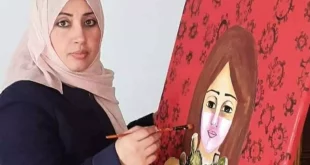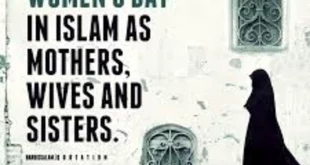.jpg)
MEN, it’s time to wake up. We’re losing ground and failing in our charge. We are ignorant of how women in the glorious middle ages used to be, so we have no idea how we should expect our women to be.
Blame it on foreign influence, disconnect with history, or whatever, but the modern status quo is unacceptable. And to set things right, we’ll have to look to our past and revive – without fearing political incorrectness – the traditions of early Muslims, for they truly are our role models. It’s important for us – 21st century men – to learn how things were done in the middle ages.
During the caliphate of Umar bin Abdul Aziz (99-101 AH/718-720 CE), he knew what some of the women were up to, so he dealt with them accordingly. He ordered Abu Bakr bin Hazm, the famous judge of Madinah, to get a hold of ‘Amrah bint Abdur-Rahman and…
Wait a minute!
…to get a hold of Amrah’s knowledge and write it down, for he feared, othewise, it may be lost forever.
‘Amrah bint Abdur-Rahman (d. 103H), one of the top students of Umm al-Mu’mineen Ayesha (رضي الله عنها), was a great scholar, a prolific narrator, and an accomplished jurist. So respected was she for her knowledge that Caliph Umar bin Abdul Aziz would seek her counsel in Islamic law.
Ayesha, the beloved wife of the Prophet (صلى الله عليه وسلم), was a powerhouse of Islamic knowledge. She would sit behind a curtain and teach the Sahabah. His other wives – Hafsa, Umm Habibah, Maymoonah, and Umm Salamah – too are well-known for their narration of hadeeth.
Fatimah, the daughter of Imam Malik (d. 179 AH/795 CE), had memorized the whole of Muwatta. She would stand behind the door and correct the reader if he made any mistake. Women would go in groups to attend conferences of ilm. The narrations not only tell us about their participation, but also the pure manner in which they would seek or teach knowledge.
Furthermore, female scholars came from very diverse backgrounds. Abida, who started life as a slave, learnt a large number of hadeeth with the teachers of Madinah. She was given by her master to Habib Dahhun, the great traditionist of Spain, when he visited the holy city on this way to the Hajj. Dahhun was so impressed by her learning that he freed her, married her, and brought her to Andalusia. It is said that she related 10,000 traditions on the authority of her teachers.
Zaynab bint Sulayman (d. 142/759), by contrast, was a princess by birth. She acquired a mastery of hadeeth, gained a reputation as one of the most distinguished women traditionalists of the time, and counted many important men among her pupils.
Karima al-Marwaziyya (d. 463/1070) was considered the best authority on the Sahih Al-Bukhari in her own time. Abu Dharr of Herat, one of the leading scholars of the period, attached such great importance to her authority that he advised his students to study the Sahih under no one else. Among her students were al-Khatib al-Baghdadi and al-Humaydi (428/1036-488/1095). Another female scholar Fatima bint Muhammad (d. 539/1144) gained the proud title of Musnida Isfahan (the great hadeeth authority of Isfahan).
Ibn Hajar al-Asqalani (d. 852/1448) says about Juwariya bint Ahmad, “Some of my own teachers and many of my contemporaries attended her discourses.”
When Abdullah married the daughter of his Sheikh Sa’eed bin Musayyib, he did not attend the study circles of his teacher for one month. He was busy learning from his wife who brought home the knowledge of Sa’eed.
These are but few examples of the countless number of female scholars we find in our history. They were not merely educated. They excelled in their fields of study, sometimes beating men and becoming the most authoritative experts in their respective eras.
The narrations put a spotlight on the glaring disconnect between our society and that of the people we wish to emulate. Where are our women scholars today?
Women complain that men do not encourage education after marriage. Men say that women neglect duties to the husband and family. Yet this conflict was not the case for our role models in the past.
Abdullah described his wife, the daughter of Sa’eed bin al-Musayyab, as:
“She was among the most beautiful people, and most expert of those who know the Book of God by heart, and most knowledgeable of the Sunnah of the Prophet, and most aware of the right of the husband.”
Women in earlier times did not allow their seeking of knowledge (or any of their halaal ambitions for that matter) to get in the way of their primary responsibilities, nor did they transgress the bounds of the Shariah in the process. Knowledge only increased their humility and obedience.
In contrast, many women of today do not know the importance of family or the goals of the Shariah revealed by the Creator concerning women. Deluded by popular notions of what education and career mean, some women go to extremes – even against their fitrah – in order to pursue the illusionary success espoused by those who do not have their best interests at heart. People who selectively cite the personality of Khadijah (رضي الله عنها) to justify women’s pursuit of financial success fail to mention, for example, that she had several children, that she took care of her family, or that she hired men to travel and trade on her behalf.
Yet one may ask what options have we – the men – given them? On the one hand, there are promoters of feminism who tell women to pursue anything they wish for regardless of their gender or role. On the other hand, there are men who don’t allow women to learn or do anything at all after marriage. This is why, I am told, many young and intelligent women are delaying marriage.
The question is this, however: In the process, is intelligence diminishing from the institution of motherhood?
Extremism breeds extremism. It is important to note that the development of Western feminism was due to the historic oppression women faced in Western societies. But we need not walk down that path. Muslim women have always been held in high regard. They made tremendous contributions to the community from the onset of Islam. Women contribute a lot today as well. But we are in need of more righteous role models. And men must play a vital role in this regard.
The prevalent extreme attitude or unwarranted concern that women will neglect their primary duties if they engage in any beneficial activity has taken a heavy toll on women. But why do we harbor such suspicious thoughts about our fellow Muslim women? Most women are naturally inclined toward being loving and caring. Just like us men, women too have concerns about family and about how good a father her husband will be and so on. Why not trust that our fellow sisters-in-Islam are quite conscientious and responsible women?
And as for men who consider it demeaning to take interest in the lives of women and children and who are concerned only about their own interests, I say this: Look at the example of the Prophet (صلى الله عليه وسلم) regarding his wives. He was the best man in every respect. He supported Ayesha (رضي الله عنها) in becoming one of the greatest Islamic scholars who have ever lived. Read also about the companionship of the Sahabah and the Tabi’oon with their women. You are, most certainly, not better than they.
But here’s a reality check for women: Because of the behavior of “educated” and “ambitious” women with their husbands today, even educated men are giving preference to passive, but dutiful, women in marriage. It takes two hands to clap (and one hand to slap). Perhaps it would help if women too did their part by learning how to be better wives.
Education should not end with marriage. It’s the primary way of progress for our families and societies. Imam Ahmad so rightly asserted that seeking knowledge is from the cradle to the grave. We only have to make the best use of the resources already available to us; we need not worry about what is unavailable to us.
With the leadership role that Allah has given men, it is imperative that we give women their due rights and facilitate what is best for their (and our) advancement.
Dear men, let’s put women in their proper place.
References:
1. Bintus-Sabeel, The Women Scholars of Madinah [PDF]
2. Bintus-Sabeel, Muslim Women Who Taught Their Husbands [PDF]
3. Muhammad Zubayr Siddiqi, Women Scholars of Hadith
 Sri lanka Muslims Web Portal Diversity and Inclusiveness
Sri lanka Muslims Web Portal Diversity and Inclusiveness



